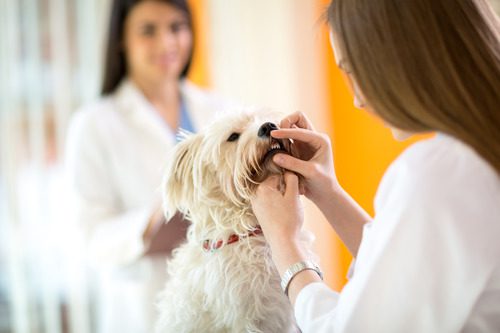Caring for your pet’s teeth is about more than fresh breath and a bright smile—it’s a vital aspect of their overall health. Just like humans, pets are prone to dental issues that can lead to discomfort, difficulty eating, and even serious health complications if left untreated. Regular dental care not only supports your pet’s well-being but also helps them live a happier, healthier life. At Lake City Animal Hospital, we’re dedicated to providing expert dental care for pets in our community. If it’s time to schedule your pet’s dental exam, call us today at (386) 755-0236 or request an appointment online to get started.

Why Pet Dental Care is Essential for Your Pet’s Health
Pet dental care is more than just a matter of keeping your pet’s teeth clean. It’s about preventing serious health issues that can stem from poor oral hygiene. Dental disease is one of the most common conditions in pets, with many dogs and cats experiencing it by the age of three. Left untreated, it can lead to pain, tooth loss, and infections that may spread to other areas of the body, including the heart and kidneys.
Benefits of Regular Pet Dental Care
Routine pet dental care helps prevent the buildup of plaque and tartar, which are major contributors to gum disease. It also addresses other issues such as broken teeth, oral tumors, and abscesses. By prioritizing dental care, you’re helping your pet avoid discomfort and promoting their long-term health. If you notice signs of dental problems such as bad breath, difficulty eating, or bleeding gums, contact Lake City Animal Hospital at (386) 755-0236 or request an appointment online to address these concerns promptly.
What Happens During Professional Dental Cleanings?
Professional dental cleanings are typically performed under anesthesia to ensure your pet remains comfortable and still during the process. Here’s what to expect during a professional dental cleaning at Lake City Animal Hospital:
- Oral Examination: Your veterinarian thoroughly examines your pet’s teeth and gums to identify any issues such as cavities, gum disease, or oral infections.
- Scaling and Polishing: Plaque and tartar are removed using specialized tools, followed by polishing to smooth the teeth and discourage future buildup.
- Fluoride Treatment: Your veterinarian may apply fluoride or sealants to protect your pet’s teeth from future issues.
- Extractions if Needed: Severely damaged teeth may be extracted to prevent further pain or infection.
- Post-Cleaning Care: After the procedure, your veterinarian will provide advice on how to maintain your pet’s dental health at home.
At-Home Dental Care: Tips for Pet Owners
While professional cleanings are crucial, at-home dental care is equally important for maintaining your pet’s oral health between visits. Establishing a daily routine can make a big difference. Here are some practical tips:
- Use a pet-specific toothbrush and toothpaste to gently brush your pet’s teeth. Aim for at least a few times a week, if not daily.
- Provide dental treats and toys designed to reduce plaque and tartar buildup. These can also help satisfy your pet’s chewing instincts.
- Some pet foods are formulated to support dental health. Ask your veterinarian if these might benefit your pet.
- Pet-safe oral rinses can help reduce bacteria and freshen your pet’s breath.
- Regularly check your pet’s mouth for signs of problems such as redness, swelling, or loose teeth.
Common Dental Issues in Pets
Here are some of the most frequent dental problems veterinarians address:
- Periodontal Disease: This gum condition results from plaque and tartar buildup and can lead to tooth loss and systemic infections.
- Tooth Fractures: Pets can crack or break their teeth from chewing on hard objects or experiencing trauma.
- Oral Tumors or Growths: Abnormal lumps in the mouth may require a biopsy to determine if they’re benign or cancerous.
- Retained Baby Teeth: In young pets, retained deciduous teeth can cause misalignment and crowding.
- Stomatitis: This painful inflammation of the mouth is more common in cats and often requires specialized treatment.
If you notice any changes in your pet’s behavior, such as avoiding food or drooling excessively, it’s time to seek veterinary care. Call Lake City Animal Hospital at (386) 755-0236 or schedule an appointment online.
How to Prepare Your Pet for a Dental Visit
Preparing your pet for a dental visit can help reduce their stress and make the experience smoother. Start by acclimating them to having their mouth handled at home. Practice opening their mouth gently and rewarding them with praise or treats. On the day of the visit, bring a comforting item such as their favorite toy or blanket. Arriving with a calm demeanor can also help your pet feel more at ease. If your pet experiences anxiety, discuss options with your veterinarian, who may recommend mild sedation or other techniques to keep your pet comfortable.
Investing in Your Pet’s Oral Health
Caring for your pet’s teeth isn’t just about maintaining their smile—it’s about supporting their overall health and happiness. Regular dental care helps prevent painful conditions and improves their quality of life. Whether it’s through professional cleanings, a consistent at-home routine, or addressing dental issues early, every effort contributes to your pet’s well-being. If you’re ready to take the next step in safeguarding your pet’s dental health, contact Lake City Animal Hospital at (386) 755-0236 or request an appointment online. Our experienced team is here to provide the compassionate care your pet deserves.

